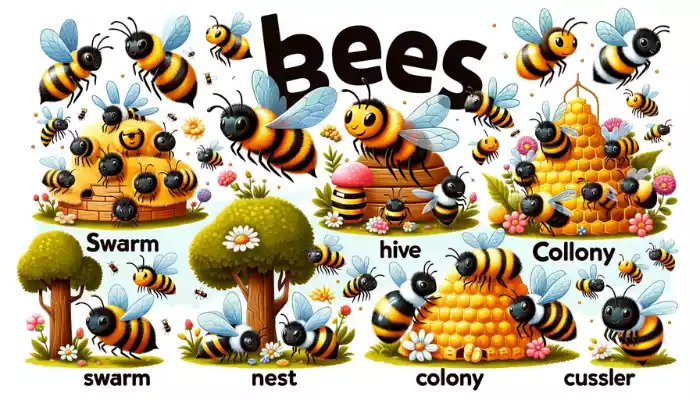Bees the tiny architects of our world work together in harmony to pollinate plants and produce honey. But when we talk about a group of bees what should we call them The English language has some fascinating collective nouns to describe these buzzing creatures. Let us dive into the world of bees and learn about the terms we use to describe their groups.
Collective Noun for Bees
| Noun | Collective Noun | Definition | Example |
|---|---|---|---|
| Bees | Swarm | A large group of bees moving together | “A swarm of bees invaded the garden.” |
| Bees | Hive | Bees living together in a structure | “A hive of bees can produce up to 100 pounds of honey a year.” |
| Bees | Colony | Bees living together, including workers, drones, and a queen | “A colony of bees works tirelessly to support the queen.” |
| Bees | Nest | Bees’ home made of wax | “We found a nest of bees in the old oak tree.” |
| Bees | Cluster | A group of bees huddled together, especially for warmth | “A cluster of bees was hanging from the branch.” |
Detailed Explanations and Examples for Bees
1. Swarm
A swarm of bees is what you might see when bees are on the move, looking for a new home. This happens when a colony splits, and a queen leaves with a group of worker bees.
- Example 1: When we were hiking, we saw a swarm of bees flying over the meadow.
- Example 2: A swarm of bees can be a sign that bees are looking to establish a new hive.
- Example 3: The beekeeper carefully captured the swarm of bees to relocate them to a new hive.
2. Hive
A hive of bees refers to the community of bees living together in their constructed wax home. This term emphasizes their living structure rather than the group itself.
- Example 1: The beekeeper checked the hive of bees for honey.
- Example 2: Our garden has a hive of bees that helps pollinate the flowers.
- Example 3: Observing a hive of bees can teach us a lot about teamwork and cooperation.
3. Colony
A colony of bees includes not just the workers but the entire social structure, including the queen and drones. It’s a term that highlights their complex social living.
- Example 1: A healthy colony of bees is essential for pollinating crops.
- Example 2: The colony of bees in our backyard has grown significantly this year.
- Example 3: Scientists study the colony of bees to understand their communication methods.
4. Nest
A nest of bees is the structure they build, often in trees or cavities, where they live and raise their young.
- Example 1: We need to be careful around the oak tree; it has a nest of bees.
- Example 2: The children were fascinated by the nest of bees they found in the park.
- Example 3: A nest of bees can sometimes be found in unexpected places, like old tires or boxes.
5. Cluster
A cluster of bees usually forms when bees huddle together for warmth during cold weather, or when they are protecting the queen.
- Example 1: In the winter, you might find a cluster of bees in the hive staying warm.
- Example 2: The cluster of bees moved slowly to keep their queen safe in the center.
- Example 3: During the cold snap, the bees formed a tight cluster to survive.
Conclusion
Bees are fascinating creatures, and the collective nouns we use to describe them reflect their complex social structures and behaviors. From a swarm to a cluster, each term provides insight into the world of bees. Learning about bees and their collective nouns not only enriches our vocabulary but also enhances our appreciation for these essential pollinators.
Quiz
1. What do we call a large group of bees moving together to find a new home?
- A) Cluster
- B) Hive
- C) Swarm
- D) Colony
2. Which term refers to the entire community of bees, including workers, drones, and the queen?
- A) Nest
- B) Hive
- C) Colony
- D) Swarm
3. What is the term for a group of bees huddled together, especially for warmth?
- A) Swarm
- B) Cluster
- C) Hive
- D) Nest
Quiz Answers
- C) Swarm
- C) Colony
- B) Cluster
The Marvelous World of Bats: Exploring Their Collective Nouns

